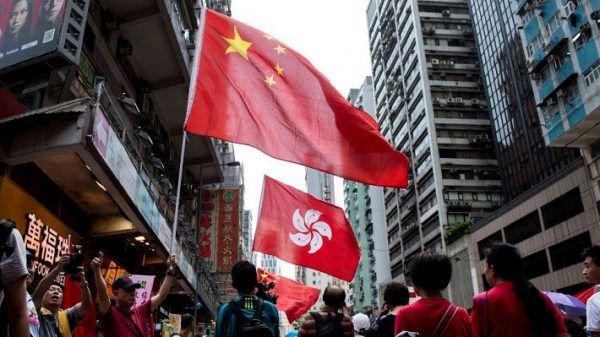China’s parliament remakes Hong Kong in its own image

Shawdesh Desk:
For almost 24 years, Hong Kong has been a kind of unwitting political laboratory, the subject of an experiment centred on the defining ideological divide of our time.
Could two entirely incompatible sets of values – authoritarianism and democracy – be held together, if not in harmony, then at least in some kind of mutual accommodation, in one city?
This was exactly what the Sino-British deal of 1984 had in mind as it laid the groundwork for the territory’s eventual handback to China in 1997.
“One Country, Two Systems”, as the formula is known, is meant to allow Hong Kong to continue until at least 2047 with its free speech, its independent courts and its vibrant – if limited – democracy, while the new sovereign power maintains its rigid, one-party rule.
The spectacle of China’s stage-managed National People’s Congress imposing sweeping changes on Hong Kong’s political system – by a true-to-form unanimous vote – is for many observers the moment that experiment goes up in smoke.
As China frequently points out, Hong Kong’s former colonial masters were slow to offer its citizens a democratic voice.
There may well have been good reasons for the foot-dragging, not least the warnings as far back as the 1950s from China that any attempt to introduce self-governance would lead to invasion.
Nonetheless, the Hong Kong handed to China – while democratically deficient in terms of universal suffrage – had other deeply ingrained freedoms that were part and parcel of its status as a free-wheeling capitalist economy and a free-trading port.
“Although we’ve never had democracy,” former Democratic Party spokesperson Emily Lau tells me, “the irony is the level of freedoms, personal safety and the rule of law that we have enjoyed for decades is much higher than in some places that have periodic elections.”
Those traditions are in stark contrast to the system of governance practised by its political masters in Beijing, and that tension has been at the heart of the tussle over what the “two systems” part of the bargain means ever since.
The turning point
China argues that it has tried to uphold the Basic Law, the mini-constitution that was meant to embody the spirit of the Sino-British Joint Declaration.
It has even attempted in good faith, it says, to enact Article 45 which calls for the introduction of universal suffrage for the election of the city’s leader, the chief executive.
The plan was scuppered by the 2014 “Umbrella Movement” driven by anger over the mechanism for choosing the candidates in which Beijing would continue to wield a veto.
The attempts to enact a National Security Law, again stipulated by the Basic Law, has also led to protests.
In the end, the sticking point has been less a question of the technicalities of the proposed changes – and more a question of profound distrust.
Most countries have national security legislation, all democratic systems are imperfect in some way, but few have these institutions overseen by a rising, authoritarian superpower.
And the tragedy for Hong Kong’s beleaguered pro-democracy movement is that each time it has tried to push back against Beijing, it has found itself worse off than before.
The tipping point came with the massive, sometimes violent, protests in 2019 over plans to introduce an extradition bill, potentially allowing Hong Kong suspects to be sent for trial in China.
The disorder gave Beijing the pretext it needed to finally push through the National Security Law, which had an overnight, chilling effect on the ability to protest.
The law sets out vague, sweeping offences of “secession”, “subversion”, and “collusion” with foreign forces, and with the possibility of extradition a central feature.
Serious cases can be transferred to the mainland for trial with far less oversight than would have been the case under the rejected extradition bill.
A series of dawn raids in January saw 55 politicians and activists arrested, with 47 now charged.
Simply holding up protest banners or the wearing of T-shirts are potentially enough to get someone detained.
The effort by Hong Kong democrats ahead of last year’s elections to hold unofficial primaries – as a tactical way to increase their chance of winning a majority in the Legislative Council (LegCo) – looked like it might almost have succeeded.
They had, after all, swept the board at the 2019 local elections – the city’s only genuinely democratic poll – a result that confirmed the depth of the support for their cause and one that will have seriously spooked Beijing.
But the LegCo primaries plan backfired too – the election was cancelled – ostensibly for reasons of pandemic control – and Beijing brought in the reforms now rubber stamped by the National People’s Congress, and under which the chances of pro-democrats winning a majority have gone for good.
Emily Lau is in no doubt about the significance of the new requirement that all candidates will be vetted, by a committee stuffed with Beijing loyalists, to make sure they’re “patriots”.
“If they are going to impose a system on Hong Kong whereby the voters would in effect be disenfranchised and whereby my party or other pro-democracy people will not be free to take part in elections independently and freely, then One Country, Two Systems is over,” she says.
Democracy gives way
Even Hong Kong’s pro-Beijing politicians appear to suggest that something fundamental has changed.
Regina Ip is the founder of the New People’s Party, with a seat in LegCo and a member of the governing Executive Council.
While she insists that One Country, Two Systems isn’t over, she seems less certain about whether it any longer aims to accommodate democracy.
“I think Beijing may be exploring a movement toward alternative systems, such as what some Western thinkers advocate – epistocracy – the rule by more knowledgeable, high information people,” she tells me.
I put it to her that such a system sounds very undemocratic.
“A democratic system has no intrinsic value unless it can deliver good outcomes,” she replies.
“We have had 23 years of experiments with democracy, the outcomes are far from satisfactory. We are underperforming in many ways.”
Chinese state media also appears to be moving the goalposts, arguing that One Country, Two Systems has always referred not to political differences, but rather to the need to preserve two different economic systems.
The British signatories to the handover agreement may once have hoped that the fundamental contradiction at the heart of it would be resolved as China modernised, enacted its own internal reforms, and moved politically closer towards Hong Kong.
If so, it has proved wishful thinking, with China arguably more authoritarian than it was at the time the treaty was signed.
“As an inalienable part of China, we cannot afford to be a country that undermines the security of China,” Regina Ip says. “If they don’t think the current system is sustainable, the option will be to reintegrate Hong Kong, even before 2047.”
It is Hong Kong that is changing and in the long tussle between those two, incompatible sets of values, it is democracy that is finally giving way.
Emily Lau, the former Democratic Party chairperson, tells me she knows she is taking a risk, even speaking to the foreign media.
“Well of course there’s a risk,” she says, “but I mean, frankly I don’t think I have breached the National Security Law.
“But that’s me saying so… and if they say, oh yes you have, well, that’s it. Maybe when this interview is over, someone will be knocking on my door.”
(BBC)




























Leave a Reply